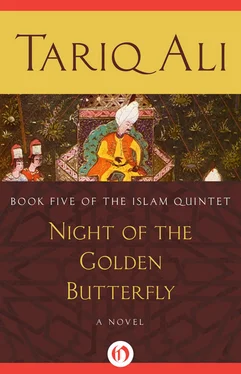She rarely said more than that, but soon after she died my father began spending a few hours each Sunday telling us more stories and sometimes reading from manuscripts he had in his possession and showing us where these places were on the map. Your friend Hanif/Confucius became really alienated from these stories and would plead with my father to be allowed to go and play with his friends on the neighbouring streets.
‘You can play with whomever and whenever you like, Hanif,’ my father would say. ‘But I sometimes worry that they will warp your mind and drag you down to the gutter. You must never lose your self-esteem.’
Hanif would surrender abjectly. He hated seeing our father upset and he would sit through our family history lessons, but his mind was usually elsewhere. Once when he was fifteen or sixteen and my father was not in the house, he told me angrily, ‘China is being transformed by Mao Zedong and the Communists. Everything will be different. What’s the use of blind ancestor-worship, which was the curse of the old society and kept the peasants enslaved? If I had been alive at that time in Yunnan, I would have fought with our forebear. What’s the point of all this now?’
I never could see it that way myself. For me it was an accretion of knowledge. Even if our forebears had not been involved in the rebellion I would have wanted to know who we were and why we had been forced to flee Yunnan. We did not leave voluntarily to seek work elsewhere. We were frightened. We thought they would kill us all. Young girls were being kidnapped every day and sold as slaves. We had kind neighbours in the other regions and they helped us because over centuries we had traded and intermarried with them as well. Many of our people were given refuge in Guangzhou and Tibet and also in Burma. What made Hanif really angry was a tendency, I don’t think it was stronger than that, on the part of my parents and Younger Granny to portray life in Yunnan before the Manchu went on their killing spree as a golden age. I know these rarely exist in history, but we always preserve memories of some good things and call them a ‘golden age’ to keep our hopes alive. For if it was possible once, it could be again. [Utopian thoughts are not necessarily bad, or are they, D? I once read something by you many years ago either in praise of or predicting a world revolution in your lifetime. Perhaps I misunderstood what you wrote, but even though the thinking behind it struck me as crude and schematic, I liked the Utopian strain. Have I got it completely wrong? If so, apologies.]
There were some good things that happened in Yunnan when Suleiman declared himself the Sultan. He put a stop to the ceaseless raids authorized by the Qing court, which had affected most Yunnanese, who regarded the Han marauders as odious. I once compared the Yunnanese Sultanate to Yenan and the Maoist attempt to unite the people against foreign (in their case, Japanese) aggression. Suleiman tried to unify Yunnan as a single state to stave off the imperial masters in Beijing. Just because the Chinese empire was coterminous with the people it conquered did not make the Manchu better than the Japanese.
Of course I developed this line of thinking to argue against Hanif’s uncritical and crude Maoism. [And yours? Or did your brand of Marxism impose a ban on blind worship? Can’t remember now.] Of course he was enraged at any comparison of the revolutionary government to the reactionary Manchu, but that was not what I was arguing. I was simply comparing it to a mid-nineteenth-century uprising that succeeded for a while in creating a state that was not theocratic like the Taiping Heavenly Kingdom in Nanjing, where reading the Bible was made compulsory.
Hanif got so angry with me one day that he sat in the living room and read a few books and manuscripts. He had a typical Elder Brother look on his face when I came home from Nairn one day, a mixture of contempt and triumph. ‘Let me tell you a few things, Jindié’, he said, ‘before you take ancestor worship in this household to such heights that it becomes difficult to find a way down.’ I was pleased at being taken seriously and sat down obediently to listen to Elder Brother.
He picked up the late-nineteenth-century book he had found on Father’s bookshelves and read out the following passage:
‘Dù Wénxiù set into action a series of building programs based on Qing imperial institutions in Beijing, including an imperial Forbidden City. At both the upper and lower passes, he had Great Walls built, with only one entrance, which ran from high in the Cangshan Mountains deep into Erhai Lake, making the valley impenetrable.’
I shrugged my shoulders. ‘So what?’
‘That is far too childish, Jindié. So what? So this great forebear was engaged in pure mimicry. Qing buildings and Ming robes.’
‘I don’t think that was so stupid. He wore Ming robes to stress that it was the Manchu who were the interlopers.’
‘But Jindié, don’t you understand what I’m saying? There was nothing progressive about Sultan Suleiman. The Taiping were better. They nationalized the land and gave women equal rights.’
That drove me mad: ‘And imposed a Christian theocracy! They were much more irrational. The crazy guy who led the revolt believed he was the younger brother of Jesus. You prefer them only because the Maoists refuse to recognize the Yunnan rebellion as progressive for fear of encouraging something similar. But I accept that Sultan Suleiman was not a progressive. How could he be? Your beloved Marx hadn’t yet been translated into Chinese.’
‘I know, but the French Revolution had taken place. In this part of the world, Sultan Tipu, who was fighting the British fifty years before Suleiman’s victory, exchanged friendly letters with Napoleon in which he signed himself “Citoyen Tipu”. At least he tried.’
‘But his enemy was Napoleon’s enemy, and anyway Napoleon made himself a Sultan. Suleiman did not appeal for outside help. He knew he could win only with the support of his own people.’
‘Then why did one of his generals appeal for support to Queen Victoria?’
‘That was after the defeat, and he appealed for refuge, which is how we came to Lahore.’
Later when I asked Father about why Suleiman had tried to build a Forbidden City in Dali, he smiled.
‘Very simple. He wanted to show that his government was for all the Yunnanese, including the Han. The architecture was designed to reassure people that they could have their own state, just like the Manchu in Beijing. His enemies were spreading the rumour that everybody would be forcibly converted to Islam. He knew it was an attempt to divide the Yunnanese and did everything possible to counter that suggestion. Large banners were painted and hung over the city walls: Make Peace with Han Chinese, Down with Qing Court: Unite Hui and Han people as one, to erect the flag of rebellion, to get rid of Manchu barbarians, to resurrect Zhonghua, to cut away corruptions, to save the people from water and fire .
‘Sometimes he deliberately refrained from praying in the Grand Mosque on Friday, spending the afternoon with non-Hui leaders drinking rice wine. Of course he never touched pork. That would have been going too far. The seal Suleiman used was in Chinese as well as Arabic, but the calligraphy was in our own style. Go and look at it. It’s there, just above the mantelpiece, one of the few mementos Elder Granny managed to keep, apart from one robe.’
The more Hanif became disaffected from our Yunnanese past, the more it became a refuge for me. How could one fail to be moved by the glorious resistance of the Yunnanese and our ancestors? The impact of the victory in Dali was beginning to spread. It’s always like that isn’t it, D? A big wave creates ripples. Then and now.
Читать дальше












